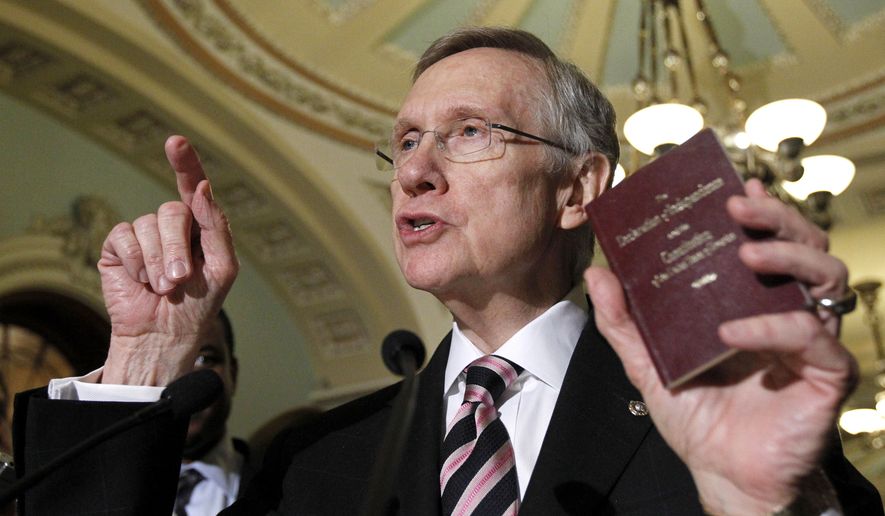Senate Democrats conceded defeat Thursday and pulled their $1.1 trillion spending bill loaded with earmarks from the chamber floor, stymied by Republicans who unified to block the massive bill in the final days of a contentious session of Congress.
Angered at what happened, Senate Majority Leader Harry Reid, Nevada Democrat, said nine Republicans, who had earlier promised to vote for the bill, had withdrawn their support in the last 24 hours. And he berated fellow lawmakers for ceding spending authority to the executive branch.
But Republicans said one lesson they learned from last month’s election that big spending bills - in this case, a 1,924-page measure Democrats produced just two days earlier - shouldn’t be jammed through the chamber with short-circuited debate.
“The reason he doesn’t have the votes is because members on this side of the aisle increasingly felt concerned about the way we do business,” said Senate Minority Leader Mitch McConnell, Kentucky Republican.
Instead of the full-year spending bill, Mr. McConnell and Mr. Reid said they will work on a “continuing resolution” to keep the government running into the new year.
The stunning turn of events - which was about as much drama as the Senate floor has seen in years - undercuts President Obama, whose White House on Thursday had backed the omnibus spending bill as the best of a bad lot of options.
That had marked a reversal from earlier this year, when Mr. Obama had decried pork-laden bills and had even vowed to veto a bill that included funding for an alternate production line for an engine for the F-35 Joint Strike Fighter - both of which were included in the spending bill.
After withdrawing his own spending bill, Mr. Reid instead scheduled showdown votes for Saturday on the Dream Act, which would legalize hundreds of thousands of illegal-immigrant children and young adults, and on repeal of the military’s policy banning gays and lesbians from serving openly in the armed forces.
Both of those measures have passed the House in recent days, and if they survive Republican-led filibusters and pass the Senate, they would go straight to Mr. Obama for his signature.
The repeal of “don’t ask, don’t tell” has a greater chance of passing than the immigration legislation.
House lawmakers already have passed their own version of a continuing resolution. Theirs would fund the government through Sept. 30 at 2010 levels, about $16 billion less than the Senate’s massive spending bill that died Thursday night.
Democrats are already more than 2 1/2 months overdue for producing the 2011 spending bills, since the fiscal year began Oct. 1. A short-term funding bill would push decisions off until next year, when Republicans will control the House and have greater numbers in the Senate, increasing their leverage.
A key battle has been over earmarks, which represent less than 1 percent of discretionary spending, but have become a powerful symbol of excessive government. Since the elections, both House and Senate Republicans have voted to impose temporary bans on new earmark requests in the coming year.
But Mr. Reid defended them as the basic function of Congress.
“That’s our job. That’s what we’re supposed to do,” he said as he chastised fellow senators who, while having requested pork-barrel spending earlier this year, decried their inclusion in the spending bill.
Mr. Reid said he didn’t want Congress to cede any more power to the administration, which he said would make many of the ground-level spending decisions if Congress doesn’t. And Mr. Reid challenged his critics to voluntarily agree to strip their own earmarks out of the bill, and said so far, nobody has taken him up on that.
Before it was withdrawn, the omnibus - a consolidation of more than a dozen annual spending bills that Congress failed to pass as part of its normal budgetary process - had been shaping up as the first postelection test of Mr. Obama’s new, tougher public stand on wasteful spending.
Indications had been that Mr. Obama would sign the omnibus.
“We understand it is not perfect, but it is what the leaders in very important departments like the Pentagon and the State Department have said are necessary and needed,” said White House press secretary Robert Gibbs.
Now, with the bill withdrawn, Mr. Obama won’t have to face that test.
The parallels to the end run in December 2009 were striking. Then as now, the Capitol was blanketed by snow and Congress was eyeing the exits, but leaders were threatening Christmas Eve sessions to get work done on the health care bill.
But unlike 2009, when the Democratic caucus held 60 seats and could power legislation through, Republicans now hold 42 seats, which is enough to sustain filibusters.
Also, Republicans said many of the lawmakers who were poised to vote on the legislation are retiring or were defeated for re-election last month.
“The lame-duck Congress has a superseded mandate, making the actions of this Congress increasingly illegitimate especially if they’re large, expensive and last far into the future,” said Sen. Mark Kirk, Illinois Republican and one of those who won election just last month. He was seated early because he was filling the seat held by a placeholder after it was left vacant by Mr. Obama’s 2008 victory
• Stephen Dinan can be reached at sdinan@washingtontimes.com.
• Kara Rowland can be reached at krowland@washingtontimes.com.




Please read our comment policy before commenting.